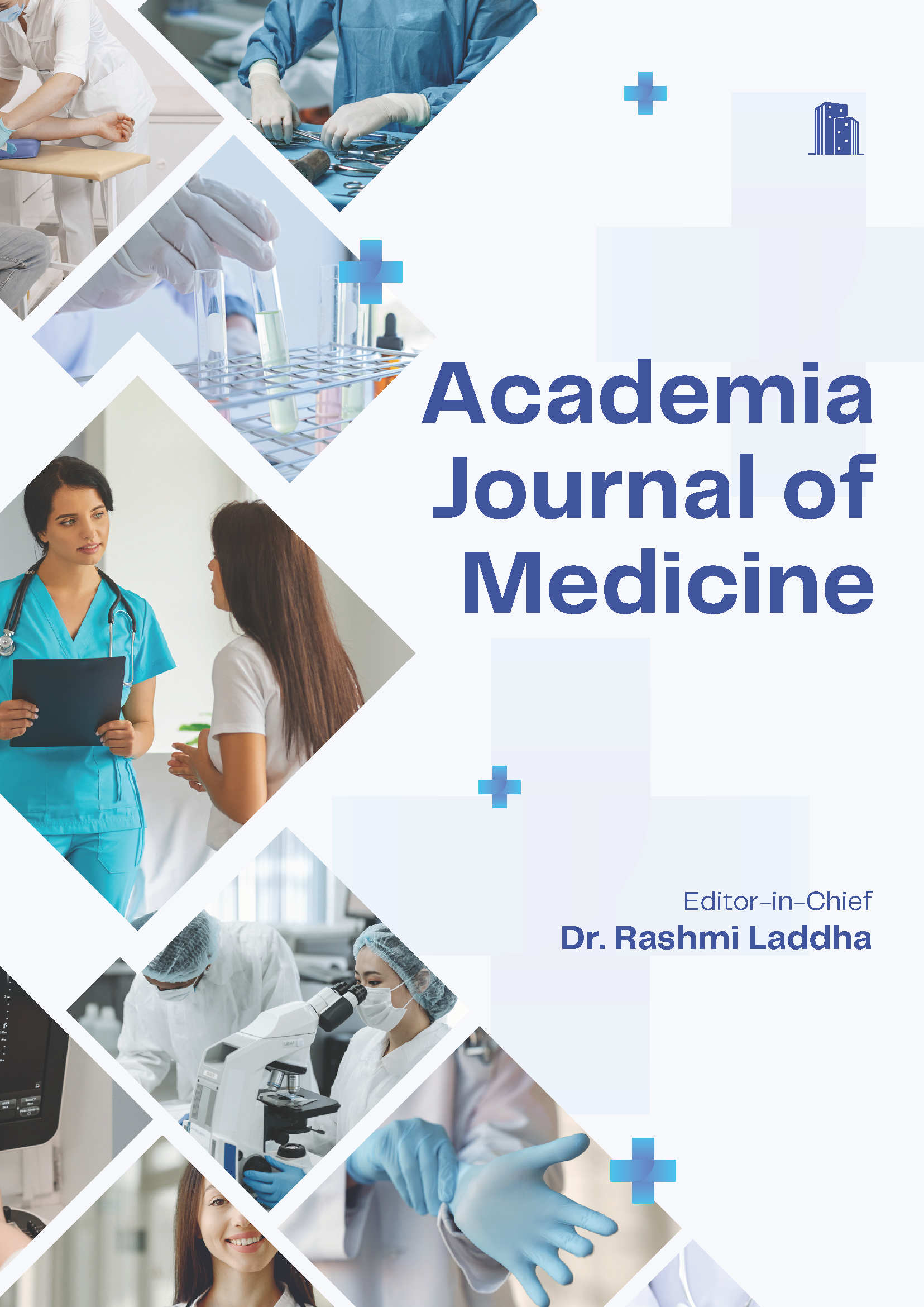A Case Report on the Integrative Management of Chronic Kidney Disease: An Ayurvedic Approach
DOI:
https://doi.org/10.48165/ajm.2024.7.02.9Keywords:
Chronic Kidney, Disease (CKD), Ayurveda, Stage V CKD, Panchakarma therapy, Hypertension, Vrikka, Yoga and lifestyle modificationAbstract
Chronic Kidney Disease (CKD) is a progressively debilitating condition, primarily affecting individuals with diabetes mellitus and hypertension, contributing significantly to global morbidity and mortality rates. As of 2021, CKD has emerged as the 9th leading cause of death worldwide. In patients with CKD, renal function declines gradually over time, often resulting in severe complications. Conventional treatments like dialysis and renal replacement therapy remain financially inaccessible to many, leading to a growing interest in alternative medical systems such as Ayurveda. Ayurveda provides a unique perspective on CKD, categorizing it under Madhyama rogamarga vyadhi, associated with accumulated kleda (excessive bodily fluids) throughout the body. Though the kidney is not explicitly mentioned in classical Ayurvedic texts, it can be correlated with vrikka. The embryological origin of vrikka is linked to medas (adipose tissue) and rakta (blood), which, when disturbed by improper diet and lifestyle, contribute to the pathogenesis of CKD. Ayurvedic management focuses on restoring balance in these dhatus, offering a holistic treatment approach that may complement conventional therapies. A case report of a 57-year-old male diagnosed with CKD stage V in 2010 illustrates the effectiveness of Ayurvedic interventions. The patient, presenting with recurrent vomiting, loss of appetite, decreased urine output, disturbed sleep, constipation, and right lower limb cellulitis, underwent Panchakarma therapy at Jeena Sikho Lifecare Limited Hospital, Derabassi, Chandigarh, in April 2024. He followed an Ayurvedic diet, practiced yoga and made lifestyle modifications, along with Ayurvedic medication, leading to positive clinical outcomes. This case underscores the potential of an integrative Ayurvedic approach to managing CKD effectively.References
World Health Organization. (2024, August 7). The top 10 causes of death. https://www.who.int/news-room/fact-sheets/detail/ the-top-10-causes-of-death
WHO. (2024). The top 10 causes of death. https://www.who.int/ news-room/fact-sheets/detail/the-top-10-causes-of-death Institute for Health Metrics and Evaluation (IHME). (2020).
Chronic kidney disease a ‘global killer in plain sight’. https://www.healthdata.org/news-release/chronic-kidney-disease global-killer-plain-sight
Loscalzo, J., Fauci, A. S., Kasper, D. L., Hauser, S. L., Longo, D. L., & Jameson, J. L. (Eds.). (2020). Harrison’s principles of internal medicine (21st ed., Vol. 1, p. 2309). McGraw Hill.
Pandey, A., Azad Amar Singh, Bhardwaj, A., Thakur, G., & Prakash, G. (2022). Effectiveness of gravitational resistance and diet (GRAD) system in reversing chronic kidney disease (CKD) among dialysis patients. Dayanand Ayurvedic College, Shridhar
University. https://davayurveda.com/wp-content/up loads/2022/10/j-GRAD-System-Paper-FINAL-Mar-27-2.pdf Manish, Chaudhary, G., Singh, S. P., Singh, M., & Richa. (2024). Clinical evaluation of chronic kidney disease management:
Integrating lifestyle modification and Ayurveda. Internation al Journal of AYUSH, 2013(10). https://doi.org/10.22159/prl. ijayush.v2013i10.1152
Acharya, Y. T. (1998). Charaka Samhita (1st ed.). Chaukhamba Orientalia. Siddhi Sthan, Chapter 1/8.
Sharma, R. K., & Dash, B. (2010). Charaka Samhita (Text with En glish translation and critical exposition based on Chakrapani Datta’s Ayurveda Dipika). Varanasi: Chowkhamba Sanskrit Series Office. Sū. Sth. 1/102-105, pp. 56-58.
Gupta, A., & Kumar, B. (2020). Clinical perspectives on Ayurveda and immunity with special reference to Guduchi (Tinospora cor difolia). Journal of Traditional and Complementary Medicine, 10(5), 510-517. https://doi.org/10.1016/j.jtcme.2020.04.005
Sharma, R., & Singh, J. (2022). The role of Shiroabhyangam in en hancing mental clarity and reducing stress: An Ayurvedic per spective. Journal of Alternative and Complementary Medicine, 28(4), 301-307.
Kumar, A., & Verma, P. (2023). Therapeutic benefits of Shiropichu in alleviating psychological stress in chronic illness. Journal of Ayurveda and Integrative Medicine, 12(3), 215-222.
Patel, M., & Singh, K. (2022). The efficacy of leech therapy in man aging edema and improving circulation in chronic kidney dis ease patients. Journal of Traditional and Complementary Med icine, 10(2), 98-105.
Dash, B., & Sharma, R. K. (2012). Charaka Samhita: Text with En glish translation & critical exposition based on Cakrapani Dat ta’s Ayurveda Dipika. Chowkhamba Sanskrit Series.
Gupta, A., Singh, S., & Narayan, B. (2018). Mahanarayan Taila: A review of its use in Ayurveda. International Journal of Ayurve da Research, 9(4), 224-231.
Srikanth, N., & Bhuvaneshwari, S. (2016). Panchakarma: Ayurve dic Detoxification and Rejuvenation Therapy. Ancient Science of Life, 36(1), 28-32.
Immersion in thermoneutral water: Effects on atrial compliance. (2006). Aviation Space and Environmental Medicine, 77(11), 1183-1187.
Sharma, R., & Mehta, S. (2021). Effectiveness of full-body steam therapy in detoxification and metabolic enhancement in chronic conditions. Journal of Ayurveda and Integrative Medi cine, 12(1), 45-52.
Acharya, V. B. K. (2008). Bhavaprakasha Nighantu, Verse 39-41, Chitrakadi Vati section (4th ed.). Varanasi: Chaukhambha Sanskrit Sansthan.
Gokhale, A. B., Damre, A. S., & Saraf, M. N. (2002). Investigations into the immunomodulatory activity of Haridra (Curcuma longa). Indian Journal of Pharmaceutical Sciences, 64(1), 48- 51.
Sharma, P. V. (2001). Dravyaguna Vijnana (Materia Medica of Ayurveda) (Vol. II). Varanasi: Chaukhambha Bharati Acade my.
Singh, N., & Rastogi, R. P. (2015). Inhibition of oxidative stress and
inflammation in kidney diseases by Ayurvedic herbs: Role of polyphenols and flavonoids. Journal of Ayurveda and Integra tive Medicine, 6(1), 50-55.
Reddy, G. D., Chary, G. D., Bhargavi, A., & Srinivas, P. (2013). Clin ical efficacy of Punarnava (Boerhaavia diffusa) in manage
ment of CKD. Journal of Ayurveda and Integrative Medicine, 4(4), 229-234.
Singh, A., Ghosh, S., & Saha, S. (2011). Role of Tribulus terrestris (Gokhru) in renal disorders: A pharmacological review. Jour nal of Ayurveda and Integrative Medicine, 2(1), 9-16.

